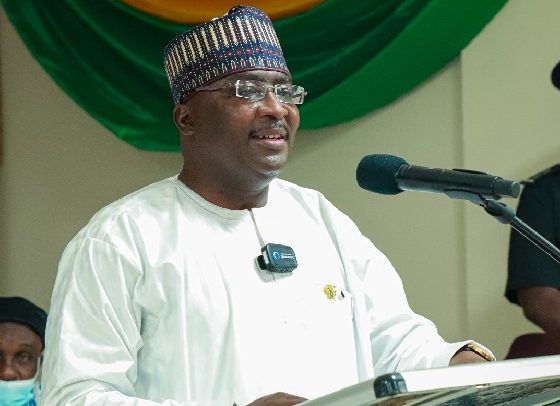Vice-President, Dr Mahamudu Bawumia is wondering why six form economists
are refusing to appreciate and understand the numerous benefits of the ongoing digitisation of the economy.
He believes that the massive digitisation should be obvious to anyone considering the person’s knowledge as a learned six form economist in a subtle jab at John Dramani Mahama.
The Vice President thinks that the six form economists should stop blaming him in their quest not to understand and appreciate the digitisation of the economy but blame their six form teacher for failing them in that area.
“Ladies and gentlemen, the digital economy is a massive economy that should be obvious of course to anybody who have done six form economics and they should understand. But if you don’t understand that it’s a massive economics then you shouldn’t blame me. You should blame your six form teacher,” Vice President said this when speaking at the 76th graduation ceremony of the Trinity Theological Seminary, Legon on Saturday November 13, 2021.
John Mahama in an apparent reference to his six form economics regarding the comatose Komenda sugar factory, said the factory should procede the planting of sugarcane instead of the other way round.
He noted that Nana Addo Dankwa Akufo-Addo is taking advantage to fight corruption and transform the country’s economy.
Bawumia mentioned that albeit the several pronouncements made in the past expressing a desire to fight corruption, but these have largely failed, hence the decision by the Akufo-Addo government to digitize the process of accessing government services and reduce the human interface, which lends itself to corruption.
“One of the major moral cankers facing our society is that of corruption. It is one of the things that every political party talks about but very little has been done about it in the past. We have killed people in the past and it has not worked. We have passed many laws and they have not been enforced. We have appealed to people’s sense of morality and it has not worked.
“When we came into office, one of the approaches we took to address the issue of corruption is to put in place systems that eliminate corruption through digitalization. Through digitalization we have been able to tackle corruption at the Passport office, Ports, GRA – TIN is now the Ghanacard number, SSNIT, NHIS, you can purchase electricity credits using your mobile phone. Every public sector worker will be uniquely identified by the Ghanacard number – no more double salaries.
“The Motor Insurance database, containing the data of all the insurance companies, has ensured that now we don’t have fake insurance certificates. You can dial a short code and check the insurance status of a car before you board. The data of the Births and Deaths Registry is being digitized, to take out fake birth certificates. And now, with the Ghana.Gov platform, you can access all Government services and make the necessary payments without any major human interventions, drastically reducing corruption.”
“We are building a new system to underpin the economy,” he explained.
“A system that makes for greater transparency, promotes accountability and efficiency in every aspect of public interactions. It is a system that minimizes incentives to pay bribes and opportunities for corruption in the delivery of public services.”
He has therefore urged Ghanaians, especially politicians, to inculcate moral values and high standards in the quest to build a society underpinned by a common set of aims and beliefs.
The Vice President also called on politicians to emulate the Akufo-Addo government by backing up their claims of fighting corruption through deeds, not just words, to make Ghana a better place.
Bawumia said in today’s world, it has become important that countries deliberately develop a society of persons who are not merely prepared for jobs, but are also set for ongoing growth in all aspects of life to make a difference in the world.
“As Ghanaians, we could build a distinct moral identity and constitute a reference point for people of other nations. We must endeavour, both in our public and private lives, to do what is morally right and eschew what is morally evil. A high sense of morality is “sine qua non” of good citizenship. That much, not material wealth, not prosperity religion, is what we need in order to build a good society,” according to him.
Speaking on the theme for the celebration, “faith-based education, morality and nation-building”, the Vice President indicated that individual and national, concerted efforts would be required to rekindle the core societal values of the country.
“We need to work consciously on the nation’s value systems to enhance the moral temper of the country to help accelerate national development.
Our values are very important, and we should hold on to them.
“As data indicates, a majority of Ghanaians are religious. Therefore, religion does not only have a profound influence on our moral values and life, but also on the development of our country.”
By Vincent Kubi


